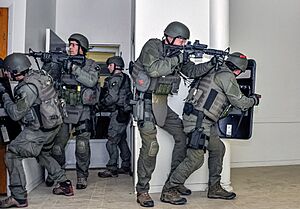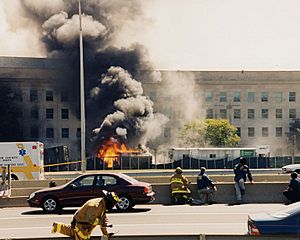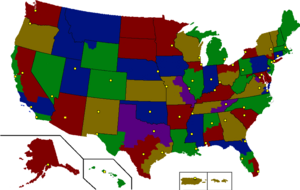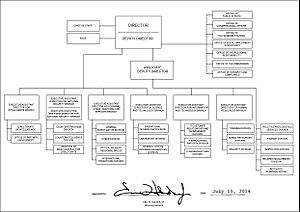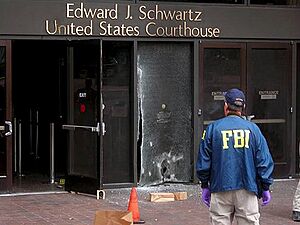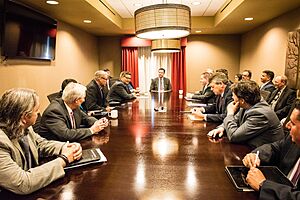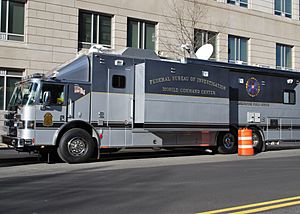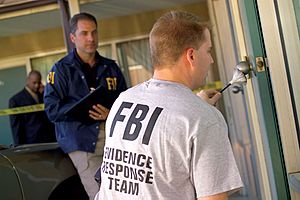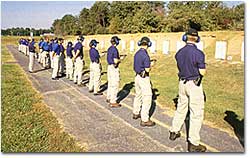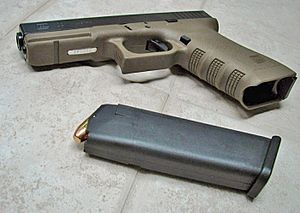Federal Bureau of Investigation facts for kids
Quick facts for kids Federal Bureau of Investigation |
|
|---|---|
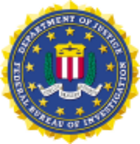
Federal Bureau of Investigation's seal
|
|
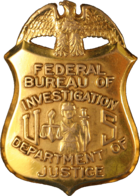
FBI special agent badge
|
|

|
|
| Abbreviation | FBI |
| Motto | Fidelity, Bravery, Integrity |
| Agency overview | |
| Formed | July 26, 1908 (as the Bureau of Investigation) |
| Employees | ≈38,000 |
| Annual budget | US$9,748,829,000 (FY 2021) |
| Jurisdictional structure | |
| Federal agency | United States |
| Operations jurisdiction | United States |
| General nature | |
| Operational structure | |
| Headquarters | J. Edgar Hoover Building Washington, D.C., U.S. |
| 38°53′43″N 77°01′30″W / 38.89528°N 77.02500°W | |
| Agency executives |
|
| Parent agency | Department of Justice Office of the Director of National Intelligence |
| Divisions |
|
The Federal Bureau of Investigation (FBI) is a very important agency in the United States. It works to protect the country and enforce federal laws. The FBI is part of the United States Department of Justice. It also works with the U.S. Intelligence Community. This means they gather information to keep the country safe.
The FBI helps fight against terrorism and spies. They also investigate many types of federal crimes. The FBI has offices in major cities across the U.S. They also have offices in U.S. embassies around the world. These international offices help them work with security services in other countries.
The FBI was first started in 1908. It was called the Bureau of Investigation (BOI). Its name changed to the Federal Bureau of Investigation (FBI) in 1935. The main headquarters of the FBI is in the J. Edgar Hoover Building in Washington, D.C..
Contents
- What the FBI Does
- History of the FBI
- How the FBI is Organized
- FBI's Legal Powers
- FBI Buildings and Technology
- FBI Personnel
- FBI Firearms
- FBI in Media
- Notable FBI Personnel
- See also
What the FBI Does
FBI's Main Goal
The FBI's main goal is to "protect the American people and uphold the Constitution of the United States". This means they work to keep everyone safe and make sure laws are followed.
Top Priorities
The FBI focuses on several key areas to keep the country safe:
- Protecting the U.S. from terrorist attacks.
- Stopping foreign spies and cyber attacks.
- Fighting serious cybercrime.
- Stopping corruption in government.
- Protecting people's civil rights.
- Fighting large criminal groups.
- Stopping major financial crimes.
- Fighting serious violent crime.
How the FBI is Funded
In 2019, the FBI's budget was about $9.6 billion. For 2021, they asked for about $9.8 billion. Most of this money is used for salaries and other expenses.
History of the FBI
Early Days
Before the FBI, there was a group called the National Bureau of Criminal Identification. It helped police find criminals. In 1901, after President William McKinley was killed, there was a feeling that the U.S. needed more ways to track threats.
President Theodore Roosevelt asked the Attorney General, Charles Bonaparte, to create a new investigative service. This service would report directly to the Attorney General. In 1908, Congress stopped the Justice Department from using Secret Service employees. So, Bonaparte decided to create a new agency with its own agents.
Creating the BOI
The Bureau of Investigation (BOI) started on July 26, 1908. Attorney General Bonaparte hired 34 people for this new agency. Some of them were from the Secret Service. Stanley Finch was the first "chief" of the BOI.
One of the BOI's first jobs was to help enforce the "White Slave Traffic Act" (Mann Act) of 1910. In 1932, the BOI was renamed the United States Bureau of Investigation.
Becoming the FBI
In 1933, the BOI joined with another agency and was called the Division of Investigation (DOI). Then, in 1935, it became its own independent agency. That same year, its name officially changed to the Federal Bureau of Investigation (FBI).
J. Edgar Hoover's Time as Director
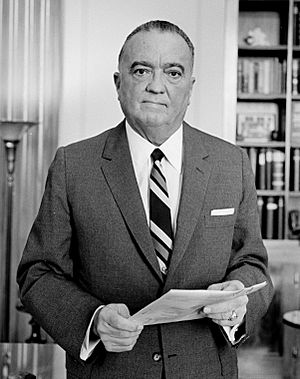
J. Edgar Hoover was the FBI director for a very long time, from 1924 to 1972. He helped create the FBI Laboratory in 1932. This lab helped make investigations more professional. After Hoover passed away, a law was made to limit future FBI directors to a ten-year term.
During the 1930s, the FBI caught or stopped many famous criminals. These included John Dillinger and "Baby Face" Nelson. The FBI also looked into groups like the Ku Klux Klan.
The FBI started using wiretapping in the 1920s to catch people breaking laws. Over time, laws about wiretapping changed. Now, the FBI needs a warrant to tap phones during investigations.
Protecting National Security
From the 1940s to the 1970s, the FBI investigated cases of espionage, which is spying against the U.S. They arrested Nazi agents who planned attacks. They also worked on the "Venona Project" with the UK. This project broke secret Soviet codes. It helped find Soviet spies in the U.S.
Japanese American Internment
In 1939, the FBI started a list of people who might be taken into custody if the U.S. went to war. Many Japanese Americans were on this list. After the attack on Pearl Harbor in 1941, many Japanese American men were taken into FBI custody.
President Franklin Roosevelt then ordered the removal of Japanese Americans from the West Coast. FBI Director Hoover did not agree with this mass removal. But the order went through. The FBI continued to watch Japanese Americans during the war. After the war, the FBI helped protect returning Japanese Americans.
Civil Rights Movement
In the 1950s and 1960s, the FBI watched civil rights leaders. They were concerned about their influence. The FBI had a program called COINTELPRO. It investigated and tried to disrupt political groups in the U.S. One target was the Southern Christian Leadership Conference, led by Rev. Dr. Martin Luther King Jr..
The FBI often investigated King. King criticized the FBI for not doing enough about white supremacist violence. Hoover publicly called King a "notorious liar." Some reports say the FBI sent King anonymous letters. These letters tried to make him feel bad.
In 1971, a group broke into an FBI office in Pennsylvania. They took files and shared them with newspapers. These files showed the FBI's COINTELPRO program. It included investigations into regular citizens. These revelations surprised the country.
Kennedy's Death Investigation
When President John F. Kennedy was killed, the FBI was asked to take over the investigation. In 1965, a law was passed. It made sure the FBI would investigate the deaths of federal officials.
Fighting Organized Crime
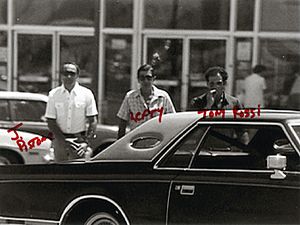
In 1953, the FBI started the Top Hoodlum Program. This program gathered information on large criminal groups. The Racketeer Influenced and Corrupt Organizations Act (RICO Act) helped the FBI fight these groups. The FBI worked undercover to break up many of these organizations. They still use the RICO Act today.
Special FBI Teams
In 1982, the FBI created a special unit called the Hostage Rescue Team (HRT). This team helps with serious situations, like terrorism. It acts like a special FBI SWAT team. In 1984, the Computer Analysis and Response Team (CART) was also formed.
From the late 1980s to the early 1990s, the FBI focused more on violent crime. They helped local police track criminals who crossed state lines. The FBI Laboratory also helped develop DNA testing.
Important Efforts in the 1990s
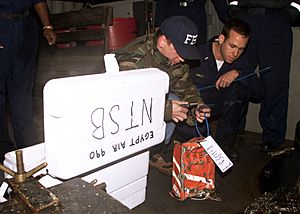
In 1992, FBI SWAT and HRT helped keep peace during the 1992 Los Angeles riots. From 1993 to 1996, the FBI increased its role in fighting terrorism. This was after the 1993 World Trade Center bombing and the 1995 Oklahoma City bombing. The FBI's technology and lab skills helped solve these cases.
During the 1996 Summer Olympics in Atlanta, the FBI investigated a bombing. They were criticized for how they handled the investigation. They settled a dispute with Richard Jewell, who was wrongly suspected.
The FBI also upgraded its technology in 1998. They created new centers to deal with Internet problems. These included computer viruses and other harmful programs. The FBI increased its electronic surveillance to adapt to new technology.
After bombings in Kenya and Tanzania in 1998, the FBI made counterterrorism a top priority. They created a system to rank investigations. Counterterrorism and national security were the highest priority. After the September 11 attacks, more agents were assigned to terrorism cases.
After September 11 Attacks
During the September 11 attacks in 2001, FBI agent Leonard W. Hatton Jr. was killed helping people escape. After the attacks, FBI Director Robert Mueller changed how the FBI worked. He made preventing terrorism a top priority.
In 2001, a high-ranking FBI agent named Robert Hanssen was caught selling secrets to Russia. He was a spy for many years. This made people question the FBI's security.
A report in 2004 said the FBI and CIA were partly to blame for not stopping the September 11 attacks. The report said the agencies needed to change. The FBI made some changes, but some people felt they were not enough. A book in 2007 said the FBI and CIA missed many chances to stop the attacks. It said the FBI's structure made it hard for different offices to work together.
Technology and Information Sharing
In 2012, the FBI created the National Domestic Communications Assistance Center. This center helps law enforcement use technology for investigations.
The FBI also has a system called eGuardian. It started in 2009. This system helps the FBI share tips about possible terror threats with local police. It allows quick sharing of information about suspicious activities.
How the FBI is Organized
The FBI has different branches and offices. Each branch has an executive assistant director. These branches are divided into divisions, led by assistant directors.
The main branches of the FBI are:
- FBI Intelligence Branch
- FBI National Security Branch
- FBI Criminal, Cyber, Response, and Services Branch
- FBI Science and Technology Branch
- FBI Information and Technology Branch
- FBI Human Resources Branch
Each branch has different jobs. For example, the National Security Branch deals with counterintelligence and counterterrorism. The Criminal, Cyber, Response, and Services Branch handles criminal investigations and cybercrime.
FBI Headquarters in Washington, D.C.
The J. Edgar Hoover Building is the FBI's main headquarters. Many important divisions are located here. These include:
- Counterintelligence Division
- Counterterrorism Division
- Cyber Division
- Criminal Investigation Division
- Laboratory Division
Other Offices
The FBI also has offices that handle things like human resources, training, and finances. The Office of the Director manages all these administrative tasks.
Ranks in the FBI
The FBI has different ranks for its employees. Here are some of them, from new agents to the top:
- New agent trainee
- Special agent
- Supervisory special agent
- Assistant special agent-in-charge (ASAC)
- Special agent-in-charge (SAC)
- Deputy assistant director
- Assistant director
- Executive assistant director
- Associate deputy director
- Deputy director
- Director
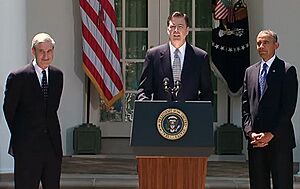
FBI Directors
The FBI director is chosen by the President of the United States. The Senate must approve this choice. The director serves for ten years. J. Edgar Hoover was the longest-serving director. The current FBI director is Kash Patel.
The director is in charge of the FBI's daily work. They make sure investigations and operations are handled correctly. The director also reports to the Director of National Intelligence.
FBI's Legal Powers
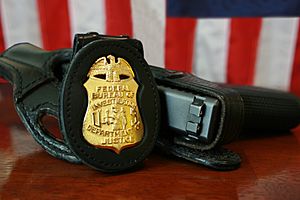
The FBI has the power to investigate crimes against the United States. This power comes from U.S. laws. The FBI also helps enforce the Civil Rights Act of 1964. They work with the Drug Enforcement Administration (DEA) to enforce drug laws.
The USA PATRIOT Act increased the FBI's powers. This included more power for wiretapping and monitoring internet activity. The FBI can also search a house without telling the residents right away.
The FBI often works with other federal agencies. These include the United States Coast Guard and U.S. Customs and Border Protection. They also work with U.S. Immigration and Customs Enforcement (ICE). After the September 11 attacks, the FBI became the main agency for terrorism investigations.
Working with Indian Reservations
The federal government is responsible for investigating serious crimes on Indian reservations. The FBI shares this responsibility with the Bureau of Indian Affairs. The FBI has a special unit called the Indian Country Crimes Unit (ICCU). This unit works to address crime problems in Indian Country.
FBI Buildings and Technology
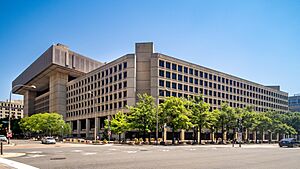
The FBI's main headquarters is the J. Edgar Hoover Building in Washington, D.C. They also have 56 field offices in major U.S. cities. There are over 400 smaller offices across the country. The FBI also has offices in U.S. embassies around the world.
Many special FBI functions are in Quantico, Virginia. There is also a large data center in Clarksburg, West Virginia. This center stores millions of fingerprints.
The FBI Laboratory is in the J. Edgar Hoover Building. It does many types of scientific work. This includes DNA analysis, fingerprinting, and examining explosives. The lab helps many state, local, and international agencies.
The FBI Academy is also in Quantico, Virginia. This is where new agents train to become FBI special agents. The training takes 21 weeks. The Academy also trains other law enforcement agencies.
In 2000, the FBI started a project called Trilogy to update its computer systems. This project had problems and cost a lot of money. In 2005, the FBI started a new project called Sentinel.
The FBI Criminal Justice Information Services Division (CJIS) is in Clarksburg, West Virginia. This office stores a lot of important information. It has programs for fingerprint identification and crime reporting. These tools help law enforcement agencies everywhere.
The FBI also leads the National Virtual Translation Center. This center translates foreign information for intelligence agencies. In 2021, the FBI started building an Innovation Center in Huntsville, Alabama. This center will focus on cyber threats and data analysis.
FBI Personnel
As of 2009, the FBI had over 33,000 employees. This included over 13,000 special agents. The rest were support staff like scientists and language specialists.
How to Become an FBI Agent
To become an FBI agent, you must be between 23 and 37 years old. You need to be a U.S. citizen and have a good background. You also need a four-year college degree and at least three years of work experience.
All FBI employees need a high-level security clearance. This means they go through detailed background checks. Special agent candidates also have to pass a physical fitness test. This test includes running, sit-ups, and push-ups. They also take a polygraph test.
Agents Who Died on Duty
Since 1925, 87 FBI agents and 2 K9s have died while on duty.
FBI Firearms
When FBI special agents complete their training, they are given a Glock 22 or Glock 23 pistol. These are semi-automatic pistols. The FBI started using Glocks in 1997. Agents can also use smaller Glock pistols as secondary weapons.
Special agents on the Hostage Rescue Team and SWAT teams use a different type of pistol. In 2016, the FBI decided to switch to new Glock pistols. These new pistols will use 9mm bullets.
FBI in Media

The FBI has often been shown in movies and TV shows. Sometimes, the FBI helps with the creation of these shows. Some popular portrayals include:
- The X-Files: This TV series shows fictional FBI agents investigating strange events.
- 24: This TV drama has a fictional agency similar to the FBI's Counterterrorism Division.
- Point Break (1991): This movie shows an undercover FBI agent.
- Donnie Brasco (1997): This movie is based on a true story of an undercover FBI agent.
- Criminal Minds (2005–2020): This TV series follows an FBI team that studies criminal behavior.
- Quantico (2015): This TV series is named after the FBI's training facility.
- FBI (2018): This TV series shows the lives of FBI agents in New York City.
- FBI: Most Wanted (2020): This spin-off follows an FBI team that hunts down wanted criminals.
- FBI: International (2021): This spin-off follows an FBI team that works internationally.
Notable FBI Personnel
- Edwin Atherton
- James Comey
- W. Mark Felt
- J. Edgar Hoover
- James Wormley Jones
- Robert Mueller
- Joseph D. Pistone
- Melvin Purvis
- Coleen Rowley
- Sue Thomas
See also
 In Spanish: FBI para niños
In Spanish: FBI para niños
- Diplomatic Security Service (DSS)
- Law enforcement in the United States
- List of United States state and local law enforcement agencies
- State bureau of investigation
- United States Marshals Service (USMS)
- FBI Honorary Medals
- History of espionage
- Inspector
- Society of Former Special Agents of the Federal Bureau of Investigation
|
 | Delilah Pierce |
 | Gordon Parks |
 | Augusta Savage |
 | Charles Ethan Porter |


